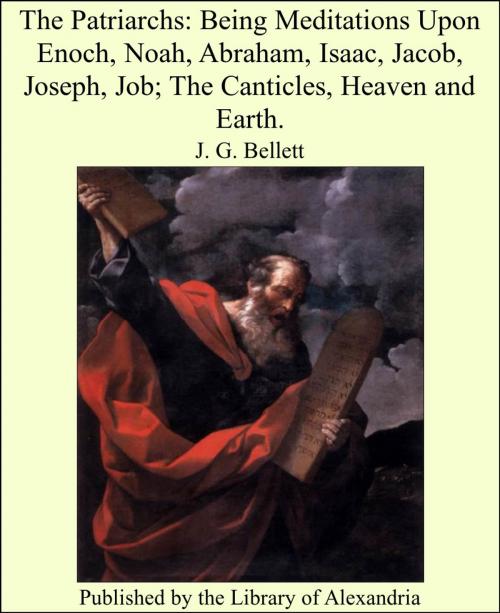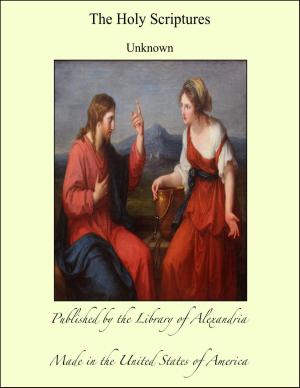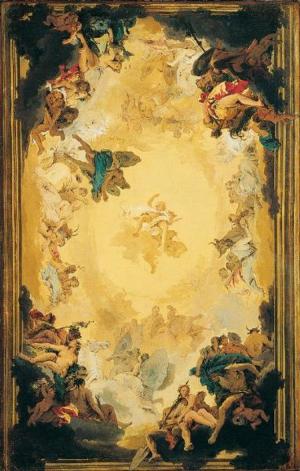The Patriarchs: Being Meditations Upon Enoch, Noah, Abraham, Isaac, Jacob, Joseph, Job; The Canticles, Heaven and Earth.
Nonfiction, Religion & Spirituality, New Age, History, Fiction & Literature| Author: | J. G. Bellett | ISBN: | 9781465536594 |
| Publisher: | Library of Alexandria | Publication: | March 8, 2015 |
| Imprint: | Language: | English |
| Author: | J. G. Bellett |
| ISBN: | 9781465536594 |
| Publisher: | Library of Alexandria |
| Publication: | March 8, 2015 |
| Imprint: | |
| Language: | English |
ENOCH. It is not so much of Enoch himself that I now purpose, in the Lord's grace, I would hope, to write a little, but rather of the times and the saints before the flood. Whether it be of them or of him, the materials, as we know, are very scanty; but in the way and wisdom of the Spirit of God, they are full of meaning and of value. A peculiar attraction has been commonly felt in the Book of Genesis. The simplicity of the narratives has to account for much of this, I doubt not. Human life is in its infancy and artlessness. The scenes are domestic, and the habits and manners such as family duties and affections were forming. This is a great source of enjoyment to the mind from this book. Such springs of pleasure are at times tasted in spite of ourselves. We are spoiled very much by the customs of the world, and we suppose that we like them. But still we find ourselves naturally at ease in such scenery as that which this lovely book presents to us. The wife of one wealthy lord, who numbered his servants by hundreds, and his flocks by thousands, would knead the cake for the traveller; and the daughter of another, without practising the language of apology, would be seen by strangers watering the family herds. Yet with all this there was the truest courtesy. The honour due to all men was as well understood as the love of kindred. It was not barbaric life, though simple and inartificial. It was not rude simplicity; but that which came from an influence that could mould and adorn life. And that influence was the knowledge of God. The times of this book were, as we know they were, unindebted to the advance of civility, or the regulations of cultivated life; but still the state of things was not barbarous, just because there was the knowledge of God. The hand of God was felt, while as yet the conceits of polished life had not time or liberty either to garnish or soil the scene
ENOCH. It is not so much of Enoch himself that I now purpose, in the Lord's grace, I would hope, to write a little, but rather of the times and the saints before the flood. Whether it be of them or of him, the materials, as we know, are very scanty; but in the way and wisdom of the Spirit of God, they are full of meaning and of value. A peculiar attraction has been commonly felt in the Book of Genesis. The simplicity of the narratives has to account for much of this, I doubt not. Human life is in its infancy and artlessness. The scenes are domestic, and the habits and manners such as family duties and affections were forming. This is a great source of enjoyment to the mind from this book. Such springs of pleasure are at times tasted in spite of ourselves. We are spoiled very much by the customs of the world, and we suppose that we like them. But still we find ourselves naturally at ease in such scenery as that which this lovely book presents to us. The wife of one wealthy lord, who numbered his servants by hundreds, and his flocks by thousands, would knead the cake for the traveller; and the daughter of another, without practising the language of apology, would be seen by strangers watering the family herds. Yet with all this there was the truest courtesy. The honour due to all men was as well understood as the love of kindred. It was not barbaric life, though simple and inartificial. It was not rude simplicity; but that which came from an influence that could mould and adorn life. And that influence was the knowledge of God. The times of this book were, as we know they were, unindebted to the advance of civility, or the regulations of cultivated life; but still the state of things was not barbarous, just because there was the knowledge of God. The hand of God was felt, while as yet the conceits of polished life had not time or liberty either to garnish or soil the scene















